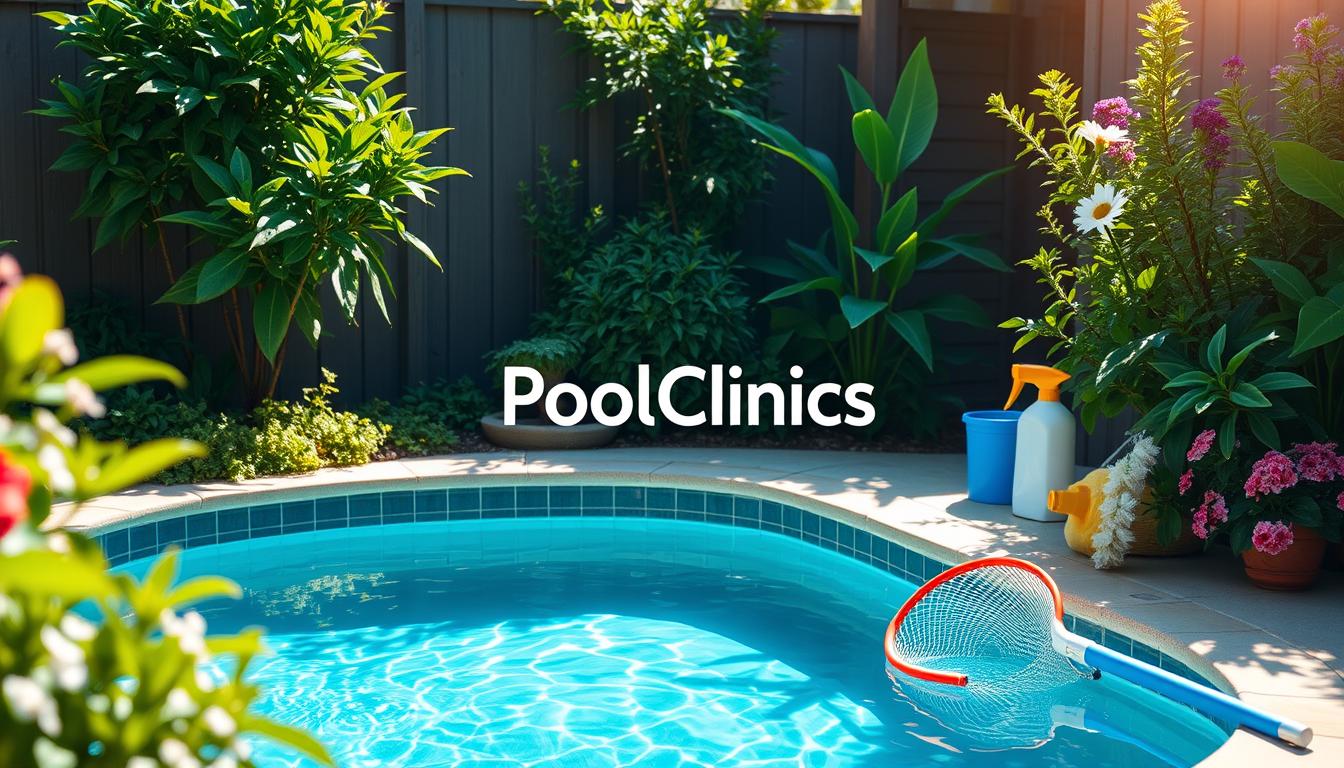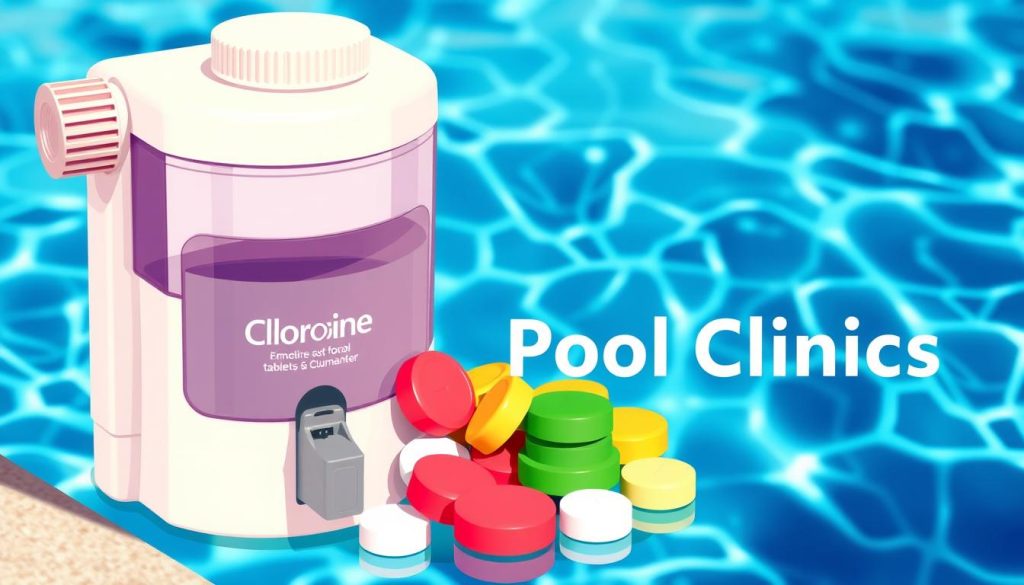
Nothing beats a cool dip in your backyard pool on a hot summer day. Smaller pools need regular care to stay clean and inviting. Simple pool maintenance tips and the right pool cleaning products can keep your water crystal-clear.
Cleaning residential pools of compact size is easier than maintaining larger ones. With proper pool cleaning equipment and routine care, your small pool can be a summer oasis. Regular attention ensures a fun and relaxing experience for everyone.
Key Takeaways
- Small pools require less frequent maintenance compared to larger pools
- Maintain proper water chemistry by testing pH and chlorine levels weekly
- Remove debris daily using a pool skimmer to keep the water clean
- Brush pool walls and floor weekly to prevent waste buildup
- Cover the pool with a tarp when not in use to minimize debris accumulation
- Use the right pool cleaning products and equipment for effective maintenance
- Regularly clean and replace filter cartridges to maintain water clarity
Essential Tools and Supplies for Maintaining a Clean Small Pool
Keeping a small pool clean requires the right tools and supplies. These items help maintain water chemistry, remove debris, and protect the pool. Let’s explore the must-haves for a clean, healthy small pool.
Pool Skimmers and Brushes
Pool skimmers are vital for removing surface debris. They prevent buildup, maintain chemical balance, and stop algae growth. Choose between manual or automatic skimmers based on your needs.
A pool brush is crucial for scrubbing walls and floors. It dislodges algae and helps maintain healthy water chemistry. Regular brushing keeps your pool in top condition.
Chlorine Dispensers and Tablets
Proper sanitization ensures a clean, safe pool. Use a floating chlorine dispenser with 3″ tablets to maintain correct chlorine levels. Follow dosing instructions carefully.
Store chlorine tablets in a cool, dry place. Keep them away from sunlight, children, and pets for safety.

Water Testing Kits
Regular water testing is key for proper balance and safety. Options include test strips, liquid drop kits, and digital testers. Test strips are quick, while liquid kits offer reliable results.
Digital testers are accurate but pricier. Choose the option that fits your needs and budget best.
Pool Covers and Tarps
Covering your pool when not in use keeps debris out. Use a plastic tarp with bendable wires or a custom-fitted cover. Covers also reduce evaporation, conserve water, and maintain temperature.
| Tool/Supply | Purpose | Frequency of Use |
|---|---|---|
| Pool Skimmer | Remove debris from water surface | Daily |
| Pool Brush | Scrub walls and floor, dislodge algae | Weekly |
| Chlorine Dispenser and Tablets | Maintain proper chlorine levels | As needed, based on water testing |
| Water Testing Kit | Check water balance and chlorine levels | Weekly |
| Pool Cover or Tarp | Keep debris out, reduce evaporation | When pool is not in use |
How to Keep a Small Pool Clean
Clean, well-maintained small pools ensure safe and fun swimming. Follow these simple steps to keep your pool sparkling clean. Use the right tools and supplies for a great swimming season.
Maintaining Proper Water Chemistry
Balanced water chemistry is key for a clean small pool. Test pH and chlorine levels weekly. Aim for a pH of 7.4-7.6 and free chlorine at 1-3 ppm.
Use liquid or tablet chlorine and shock the water when needed. This prevents green water and keeps it sanitized. Test alkalinity weekly, aiming for 100-150 ppm.
Consider a salt chlorination system for easy sanitization. It makes chlorine from salt, keeping levels steady without harsh chemicals.
Removing Debris and Cleaning Surfaces
Remove debris daily with a skimmer to keep your pool clean. Brush pool surfaces weekly to prevent algae growth. This maintains cleanliness and stops dirt buildup.
Clean the filter cartridge monthly for proper filtration. Use a manual or automatic vacuum to remove debris and keep the pool clean.
Covering the Pool When Not in Use
A pool cover prevents contamination and keeps water clean. It blocks debris, protects from UV rays, and reduces evaporation. Choose a durable, easy-to-use cover that fits your pool size and shape.
“A pool cover is recommended when the pool is not in use to keep out debris and protect it from UV rays.” – Pool Maintenance Expert
Regularly Testing and Adjusting Water Balance
Test water chemistry weekly to keep your pool clean and safe. Check pH, chlorine, alkalinity, and calcium hardness levels. Address any imbalances quickly.
| Parameter | Recommended Range | Testing Frequency |
|---|---|---|
| pH | 7.2-7.6 | Weekly |
| Free Chlorine | 1-3 ppm | Weekly |
| Total Alkalinity | 80-150 ppm | Weekly |
| Calcium Hardness | 200-400 ppm | Monthly |
Apply pool shock weekly to boost chlorine levels. Use algaecide every 1-2 weeks to prevent algae growth. Regular testing and adjustments keep your pool clean and inviting.
Conclusion
A clean small pool ensures safe and enjoyable swimming all season. Regular maintenance keeps your pool sparkling with minimal effort. Invest in tools like skimmers, brushes, and water testing kits for efficient cleaning.
Monitor water chemistry and remove debris consistently. Cover the pool when not in use to reduce chemical treatments. Regular water testing helps maintain proper pH and chlorine levels.
Break pool maintenance into manageable tasks to simplify the process. Dedicate time each week to these care tips. This prevents major issues and prolongs your pool’s life.
A well-maintained pool enhances your swimming experience. It also extends the lifespan of your pool equipment. With these practices, you’ll enjoy a clean small pool all summer.







